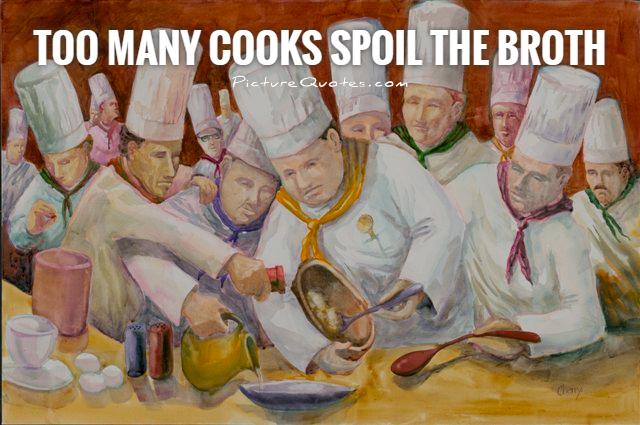Too many cooks spoil the broth

Too many cooks spoil the broth
The proverb "too many cooks spoil the broth" is a cautionary tale about the dangers of having too many people involved in a task or project. The origins of this saying can be traced back to ancient Greece, where it was first recorded in the play "The Birds" by Aristophanes. The phrase has since become a common idiom used to warn against the negative consequences of having too many people trying to do the same thing at once.The essence of this proverb lies in the idea that when there are too many people involved in a task, it can lead to confusion, inefficiency, and ultimately a poorer outcome. Each person may have their own ideas, opinions, and ways of doing things, which can create conflict and hinder progress. In the context of cooking, having too many cooks in the kitchen can result in a dish that is over-seasoned, undercooked, or just plain unappetizing.
This proverb can be applied to various aspects of life, not just cooking. In a business setting, for example, having too many decision-makers can lead to indecision, conflicting priorities, and a lack of accountability. In a creative project, too many collaborators can dilute the vision and result in a product that lacks coherence or originality.
On the other hand, having too few cooks can also be problematic. A lack of input and diversity of perspectives can lead to a narrow-minded approach and missed opportunities for improvement. Finding the right balance of collaboration and autonomy is key to achieving success in any endeavor.
Ultimately, the lesson of "too many cooks spoil the broth" is about the importance of communication, coordination, and teamwork. It is essential to have a clear vision, defined roles, and effective leadership in order to avoid the pitfalls of too many people pulling in different directions. By working together towards a common goal, a group of cooks can create a delicious broth that satisfies everyone's appetite.












 Friendship Quotes
Friendship Quotes Love Quotes
Love Quotes Life Quotes
Life Quotes Funny Quotes
Funny Quotes Motivational Quotes
Motivational Quotes Inspirational Quotes
Inspirational Quotes